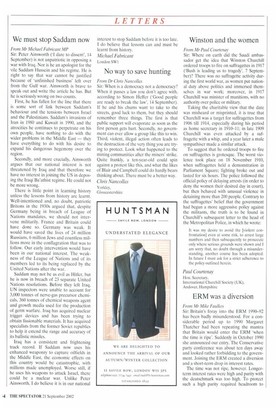We must stop Saddam now
From Mr Michael Fabricant MP Sir: Peter Ainsworth CI dare to dissent', 14 September) is not unpatriotic in opposing a war with Iraq. Nor is he an apologist for the vile Saddam Hussein and his regime. He is right to say that war cannot be justified because of 'unfinished business' left over from the Gulf war. Ainsworth is brave to speak out and write the article he has. But he is seriously wrong on two counts.
First, he has fallen for the line that there is some sort of link between Saddam's behaviour and the tensions between Israel and the Palestinians. Saddam's invasions of Iran in 1980 and Kuwait in 1990, and the atrocities he continues to perpetrate on his own people, have nothing to do with the wider problems in the Middle East — they have everything to do with his desire to expand his dangerous hegemony over the region.
Secondly, and more crucially, Ainsworth argues that our national interest is not threatened by Iraq and that therefore we have no interest in joining the US in deposing the Iraqi Ba'athist regime. He could not be more wrong.
There is little point in learning history unless the lessons from history are learnt. Well-intentioned and, no doubt. patriotic Britons in the 1930s argued that, despite Germany being in breach of League of Nations mandates, we should not intervene militarily. France and Britain could have done so. Germany was weak. It would have saved the lives of 24 million Russians, 6 million Jews and countless millions more in the conflagration that was to follow. Our early intervention would have been in our national interest. The weakness of the League of Nations and of its members led to its being replaced by the United Nations after the war.
Saddam may not be as evil as Hitler, but he is now in breach of 23 separate United Nations resolutions. Before they left Iraq, UN inspectors were unable to account for 3,000 tonnes of nerve-gas precursor chemicals, 360 tonnes of chemical weapons agent and growth media used for the production of germ warfare. Iraq has acquired nuclear trigger devices and has been trying to obtain fissionable materials. It has acquired specialists from the former Soviet republics to help it extend the range and accuracy of its ballistic missiles.
Iraq has a consistent and frightening track record. If Saddam now uses his enhanced weaponry to capture oilfields in the Middle East, the economic effects on this country would be catastrophic, with millions made unemployed. Worse still, if he uses his weapons to attack Israel, there could be a nuclear war. Unlike Peter Ainsworth, I do believe it is in our national interest to stop Saddam before it is too late. I do believe that lessons can and must be learnt from history.
Michael Fabricant
London SW1










































































 Previous page
Previous page